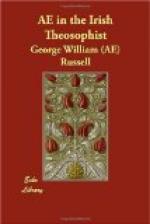Agathon, the husbandman. “Father, as I bend over the fields or fasten up the vines, I sometimes remember how you said that the gods can be worshiped by doing these things as by sacrifice. How is it, father, that the pouring of cool water over roots, or training up the branches can nourish Zeus? How can the sacrifice appear before his throne when it is not carried up in the fire and vapour.”
Apollo. “Agathon, the father omnipotent does not live only in the aether. He runs invisibly within the sun and stars, and as they whirl round and round, they break out into woods and flowers and streams, and the winds are shaken away from them like leaves from off the roses. Great, strange and bright, he busies himself within, and at the end of time his light shall shine through and men shall see it, moving in a world of flame.
Think then, as you bend over your fields, of what you nourish and what rises up within them. Know that every flower as it droops in the quiet of the woodland feels within and far away the approach of an unutterable life and is glad, they reflect that life even as the little pools take up the light of the stars. Agathon, Agathon, Zeus is no greater in the aether than he is in the leaf of grass, and the hymns of men are no sweeter to him than a little water poured over one of his flowers.”
Agathon the husbandman went away and bent tenderly over his fruits and vines, and he loved each one of them more than before, and he grew wise in many things as he watched them and he was happy working for the gods.
Then spake Damon the shepherd, “Father, while the flocks are browsing dreams rise up within me; they make the heart sick with longing; the forests vanish, I hear no more the lamb’s bleat or the rustling of the fleeces; voices from a thousand depths call me, they whisper, they beseech me, shadows lovelier than earth’s children utter music, not for me though I faint while I listen. Father, why do I hear the things others hear not, voices calling to unknown hunters of wide fields, or to herdsmen, shepherds of the starry flocks”?
Apollo answered, “Damon, a song stole from the silence while the gods were not yet, and a thousand ages passed ere they came, called forth by the music, and a thousand ages they listened then joined in the song; then began the worlds to glimmer shadowy about them and bright beings to bow before them. These, their children, began in their turn to sing the song that calls forth and awakens life. He is master of all things who has learned their music. Damon, heed not the shadows, but the voices, the voices have a message to thee from beyond the gods. Learn their song and sing it over again to the people until their hearts too are sick with longing and they can hear the song within themselves. Oh, my son, I see far off how the nations shall join in it as in a chorus, and hearing it the rushing planets shall cease from their speed and be steadfast; men shall hold starry sway.” The face of the god shone through the face of the old man, and filled with awe, it was so full of secretness. Damon the herdsman passed from his presence and a strange fire was kindled in his heart. Then the two lovers, Dion and Neaera, came in and stood before Apollo.




